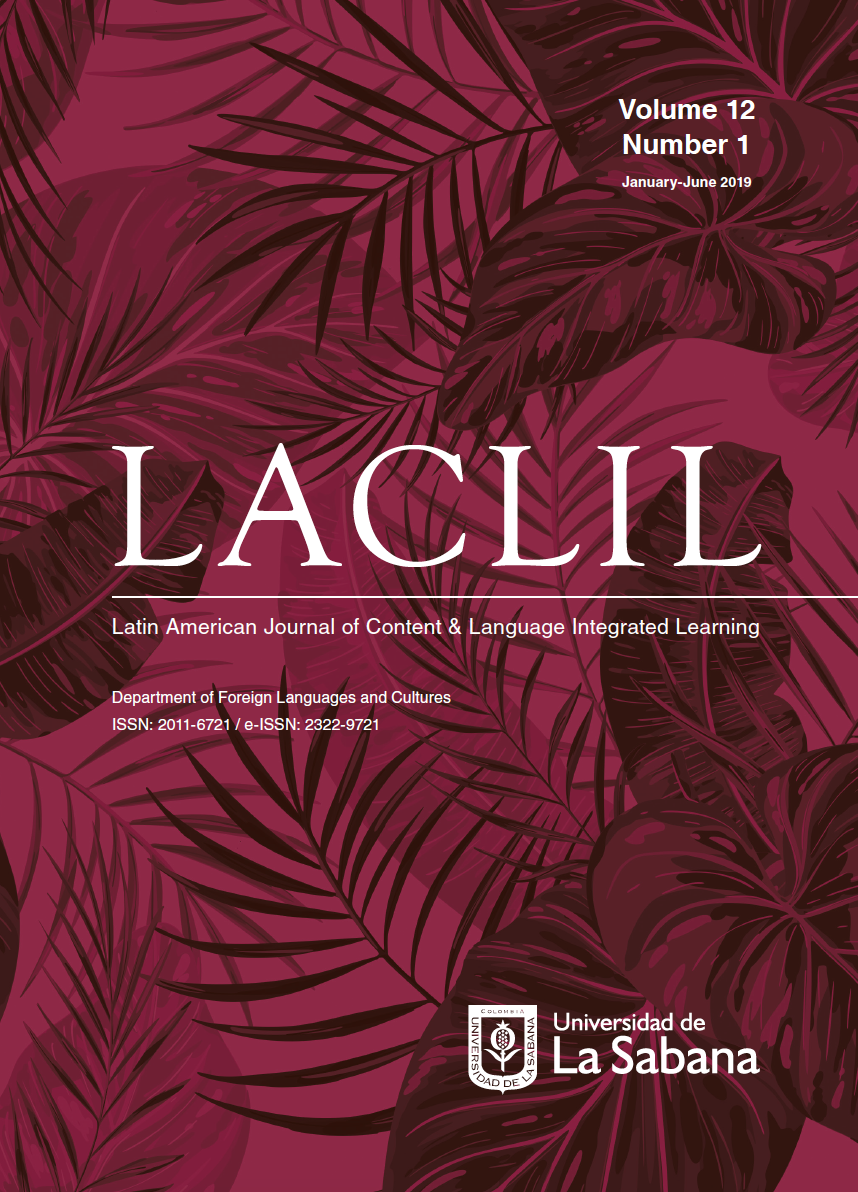The Effect of the Process-Based Approach on the Writing Skills of Bilingual Elementary Students
DOI:
https://doi.org/10.5294/laclil.2019.12.1.4Keywords:
ESL writing for youngsters, English as a second language, process approach to writing, writing strategies, bilingual education, second language instruction, writingAbstract
El efecto del enfoque basado en procesos sobre la escritura de estudiantes de primaria bilingüe
O efeito da abordagem baseada em processos na escrita de alunos bilíngues do ensino fundamental
The objective of this action research study was to assess the impact of the Process-Based Approach (PBA) on the development of the writing skills of young students who are learning English as a Foreign Language. The participants included 12 third-grade students from a bilingual private school in Manizales, Caldas. Six workshops were implemented, guiding the students to write different texts in English by using the writing process stages and applying some writing strategies, such as planning, monitoring, and evaluating their own output. Instruments such as a teacher’s journal, a writing rubric, external observations, self-assessment protocols, and L2 writing pre- and post-tests were used to collect the data. The results suggest that the PBA was useful for enhancing the writing skills of young English learners. Additionally, the strategies applied during the process bettered third-grade students’ writing performance in aspects such as content, organization, conventions, vocabulary, and fluency. Finally, the data illustrated that the PBA and the writing strategies made students feel confident about writing, which, at the same time, contributed to the students’ self-efficacy in writing tasks.
To reference this article (APA) / Para citar este artículo (APA) / Para citar este artigo (APA)
Sánchez, L. F., & López, M. M. (2019). Analysing mathematical word problem solving with secondary education CLIL students: A pilot study. LACLIL, 12(1), 72-98. DOI: https://doi.org/10.5294/laclil.2019.12.1.4
Received: 05/02/2019
Approved: 23/04/2019
Downloads
References
Atwell, N. (1987). In the middle: Writing, reading, and learning with adolescents. Portsmouth, NH: Heinemann.
Brown, H. D. (2007). Principles of language learning and teaching. White Plains, NY: Pearson Longman.
Byrne, D. (1998). Teaching writing skills. Harlow, UK: Longman.
Calkins, L. M. (1994). The art of teaching writing. Portsmouth, NH: Irwin Publishing.
Chávez, G., Matsumura, L., & Valdés, R. (2004). Investigating the process approach to writing instruction in urban middle schools. Journal of Adolescent & Adult Literacy, 47(6), 462–477. Retrieved from https://www.jstor.org/stable/40018722
Creswell, J. W. (2008). Educational research: Planning, conducting, and evaluating quantitative and qualitative research. Upper Saddle River, NJ: Prentice Hall.
Elbow, P. (1973). Writing without teachers. New York, NY: Oxford University Press.
Ferris, D. (2002).Teaching students to self-edit. In J. Richards, & W. Renandya (Eds.), Methodology in language teaching: An anthology of current practice (pp. 328–334). Cambridge, UK: Cambridge University Press.
Fountas, I. C., & Pinnell, G. S. (2001). Guiding readers and writers: Teaching comprehension, genre, and content literacy. Portsmouth, NH: Heinemann.
Gass, S., & Selinker, L. (2008). Second language acquisition: An introductory course. New York, NY: Routledge.
Graves, D. (2003). Inside writing: How to teach the details of craft. Portsmouth, NH: Heinemann.
Harmer, J. (2004). How to teach writing. Harlow, UK: Pearson Longman.
Harmer, J. (2007). The practice of English language teaching. Edinburg Gate, UK: Pearson Longman.
Harris, K., Graham, S., Mason, L., & Friedlander, B. (2008). Powerful writing strategies for all students. Baltimore, MD: Paul H. Brookes Publishing Co.
Hedge, T. (2005). Writing. Oxford, UK: Oxford University Press.
Hyland, K. (2002). Teaching and researching writing. London, UK: Pearson Longman.
Kemmis, S., & McTaggart, R. (1988). The action research reader. Geelong, Australia: Deakin University Press.
Kroll, B. (1990). Second language writing (Cambridge applied linguistics): Research insights for the classroom. Cambridge, UK: Cambridge University Press.
Oxford, R. (2001). Language learning strategies. In R. Carter, & D. Nunan (Eds.), The Cambridge guide to teaching English to speakers of other languages (166–172). Cambridge, UK: Cambridge University Press.
Raimes, A. (1983). Techniques in teaching writing. New York, NY: Oxford University Press.
Saptoka, A. (2012). Developing students’ writing skill through peer and teacher correction: An action research. Journal of NELTA, 17(1–2), 70-82. DOI: http://dx.doi.org/10.3126/nelta.v17i1-2.8094
Scott, W., & Ytreberg, L. (1990). Teaching English to children. London, UK: Longman.
Sundem, G. (2006). Improving students writing skills. Huntington, CA: Shell Education.
Serravallo, J. (2017). The writing strategies book: Your everything guide to developing skilled writers. Portsmouth, NH: Heinemann.
Shin, J. K., & Crandall, J. A. (2014). Teaching young learners English: From theory to practice. Boston, MA: National Geographic Learning.
White, R., & Arndt, V. (1996). Process writing. London, UK: Pearson, Longman.
Downloads
Published
How to Cite
Issue
Section
License
This Journal and its articles are published under the Creative Commons CC BY 4.0 DEED Attribution 4.0 International license. You are free to: Share — copy and redistribute the material in any medium or format for any purpose, even commercially. Adapt — remix, transform, and build upon the material for any purpose, even commercially. The license cannot revoke these freedoms as long as you follow the terms of the license.








